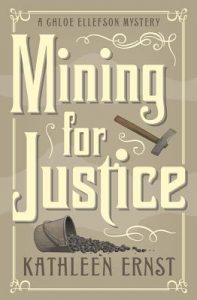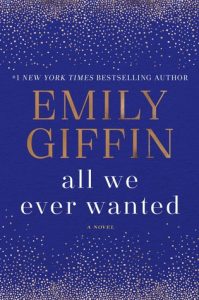 Lyla Volpe doesn’t expect her life to change after her crush takes a drunken, semi-naked photo of her at a party, because she doesn’t want to do anything about it. Tom, her working-class, single father, astonished by her complacency, cannot let it go. The boy’s mother, Nina, is sick over the incident and also cannot let it go, though her wealthy husband attempts to cover it up. The story whips back and forth on who exactly the culprit may be, but eventually the truth comes out, and Nina finally releases her insidious secret in order to save herself, her son, and his victim. The ending wrapped up quickly in a summarized chapter, disappointing readers who expected more about how the boy redeemed himself.
Lyla Volpe doesn’t expect her life to change after her crush takes a drunken, semi-naked photo of her at a party, because she doesn’t want to do anything about it. Tom, her working-class, single father, astonished by her complacency, cannot let it go. The boy’s mother, Nina, is sick over the incident and also cannot let it go, though her wealthy husband attempts to cover it up. The story whips back and forth on who exactly the culprit may be, but eventually the truth comes out, and Nina finally releases her insidious secret in order to save herself, her son, and his victim. The ending wrapped up quickly in a summarized chapter, disappointing readers who expected more about how the boy redeemed himself.
This novel demonstrates how well women are indoctrinated to be polite and quiet, even in the face of pernicious behavior of men they trust, how women justify such behavior as not so bad, not something they would call rape, or even harassment, certainly not a sex crime. Wealth is no protection, as the boy’s ex-girlfriend proves with her self-destructive actions. Giffin created credible characters who interacted as expected from the reader’s perspective, privy to information and emotional accouterments before it’s shared with other characters, showing the truth in fiction.
Fans of Liane Moriarty and Kate Moretti and Celeste Ng will appreciate Giffin’s style, ability to present complex relationships, and subject matter. I was fortunate to receive a copy from the publisher through NetGalley.
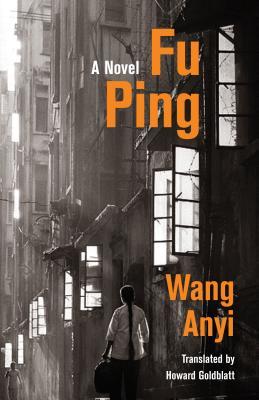
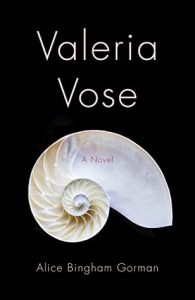 As Mallie’s marriage crumbles, she searches for her identity through religion. She falls in love with an unscrupulous priest counseling her, but bounces back and continues her journey of self-discovery. Her friend Jenny introduces her to spiritual retreats and workshops. The story nearly becomes a Christian self-help book multiple times, as it spends much time expounding upon the wisdom of the retreats and workshops. Nevertheless, it’s an excellent portrayal of a woman set loose from what she considered a solid foundation as a wife and mother in the late 70s. Having come unmoored, she must find a way to anchor herself without a partner to lean on and no job skills. The ending is credible, hopeful, and maybe a bit feminist. Gorman does a great job of showing Mallie’s emotions ricocheting around in her head, and how hard she tries to connect with the world around her. Though a bit insular, based on the Christian themes, this book tells a story of women who buy into the Mrs. degree, and how one breaks free after a crash and burn, definitely a worthwhile read. I was fortunate to receive this e-book from She Writes Press through NetGalley.
As Mallie’s marriage crumbles, she searches for her identity through religion. She falls in love with an unscrupulous priest counseling her, but bounces back and continues her journey of self-discovery. Her friend Jenny introduces her to spiritual retreats and workshops. The story nearly becomes a Christian self-help book multiple times, as it spends much time expounding upon the wisdom of the retreats and workshops. Nevertheless, it’s an excellent portrayal of a woman set loose from what she considered a solid foundation as a wife and mother in the late 70s. Having come unmoored, she must find a way to anchor herself without a partner to lean on and no job skills. The ending is credible, hopeful, and maybe a bit feminist. Gorman does a great job of showing Mallie’s emotions ricocheting around in her head, and how hard she tries to connect with the world around her. Though a bit insular, based on the Christian themes, this book tells a story of women who buy into the Mrs. degree, and how one breaks free after a crash and burn, definitely a worthwhile read. I was fortunate to receive this e-book from She Writes Press through NetGalley. Lyla Volpe doesn’t expect her life to change after her crush takes a drunken, semi-naked photo of her at a party, because she doesn’t want to do anything about it. Tom, her working-class, single father, astonished by her complacency, cannot let it go. The boy’s mother, Nina, is sick over the incident and also cannot let it go, though her wealthy husband attempts to cover it up. The story whips back and forth on who exactly the culprit may be, but eventually the truth comes out, and Nina finally releases her insidious secret in order to save herself, her son, and his victim. The ending wrapped up quickly in a summarized chapter, disappointing readers who expected more about how the boy redeemed himself.
Lyla Volpe doesn’t expect her life to change after her crush takes a drunken, semi-naked photo of her at a party, because she doesn’t want to do anything about it. Tom, her working-class, single father, astonished by her complacency, cannot let it go. The boy’s mother, Nina, is sick over the incident and also cannot let it go, though her wealthy husband attempts to cover it up. The story whips back and forth on who exactly the culprit may be, but eventually the truth comes out, and Nina finally releases her insidious secret in order to save herself, her son, and his victim. The ending wrapped up quickly in a summarized chapter, disappointing readers who expected more about how the boy redeemed himself.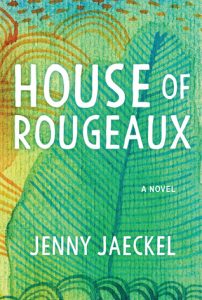 After a glimpse into her future as a leader of her people, this family saga opens with the childhood of the great Obeah, Meme Abeje, who lives to see the official end of slavery in her homeland of Martinque, and her niece Hetty’s migration to Canada, where she becomes an abolitionist with husband Dax Rougeaux. After a quick (and confusing) foray into the future of the Rougeaux family in the mid-1940s, Hetty’s granddaughter Eleanor brings the story full circle, when she visits Martinique to honor her Obeah great-great aunt at the end of the 19th century.
After a glimpse into her future as a leader of her people, this family saga opens with the childhood of the great Obeah, Meme Abeje, who lives to see the official end of slavery in her homeland of Martinque, and her niece Hetty’s migration to Canada, where she becomes an abolitionist with husband Dax Rougeaux. After a quick (and confusing) foray into the future of the Rougeaux family in the mid-1940s, Hetty’s granddaughter Eleanor brings the story full circle, when she visits Martinique to honor her Obeah great-great aunt at the end of the 19th century.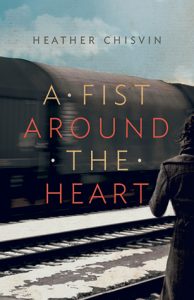 Anna “Bencke” Grieve’s life changed after Tsar Alexander II’s assassination. In fear for their lives as Jews, her mother, a privileged servant, asked her employers Count and Countess Chernovski to take Bencke and her older sister Esther with them to Canada. The Chernovski’s later adopt them, believing their parents to be dead. Bencke does her best to care for Esther, who suffers episodes from traumatic memories that incapacitate her at times, as she herself tries to fit her eccentric personality into Countess Chernovski’s picture perfect household. Decades later, Anna receives a phone call from the Winnipeg police informing her that her sister has committed suicide by stepping in front of a train. She heads to Canada seeking the truth. The story alternates between this investigation and a backstory of a life fully lived, from Anna’s forced relocation to NYC, to circumstances causing her to be deported to Russia during WWI. In the investigation, Anna learns her sister’s secrets and must live with them now.
Anna “Bencke” Grieve’s life changed after Tsar Alexander II’s assassination. In fear for their lives as Jews, her mother, a privileged servant, asked her employers Count and Countess Chernovski to take Bencke and her older sister Esther with them to Canada. The Chernovski’s later adopt them, believing their parents to be dead. Bencke does her best to care for Esther, who suffers episodes from traumatic memories that incapacitate her at times, as she herself tries to fit her eccentric personality into Countess Chernovski’s picture perfect household. Decades later, Anna receives a phone call from the Winnipeg police informing her that her sister has committed suicide by stepping in front of a train. She heads to Canada seeking the truth. The story alternates between this investigation and a backstory of a life fully lived, from Anna’s forced relocation to NYC, to circumstances causing her to be deported to Russia during WWI. In the investigation, Anna learns her sister’s secrets and must live with them now.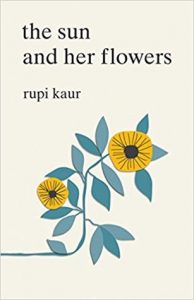 Rupi Kaur divided her poetry collection into five sections. Wilting begins…on the last day of love…my heart cracked inside my body…and continues this part of the story throughout the following poems. Falling exposes the self in an introspection of negativity, moving from grief to the numbness of sudden aloneness. Rooting reaches the stage of connecting with community, recognizing pain and fear, power and strength on a larger scale. Rising expands and contract the self, bringing the strength inward…i will welcome…a partner…who is my equal…celebrating the self and being proud of ancestry. Blooming shares the fruits of the labors of those who have gone before…i am the first woman in my lineage with freedom of choice…praising her parents’ decision to immigrate and allow daughters to fully become themselves. Kaur’s poetry has been derided for being so accessible to the masses, which is a shame, because what then is the point of exclusivity of art…
Rupi Kaur divided her poetry collection into five sections. Wilting begins…on the last day of love…my heart cracked inside my body…and continues this part of the story throughout the following poems. Falling exposes the self in an introspection of negativity, moving from grief to the numbness of sudden aloneness. Rooting reaches the stage of connecting with community, recognizing pain and fear, power and strength on a larger scale. Rising expands and contract the self, bringing the strength inward…i will welcome…a partner…who is my equal…celebrating the self and being proud of ancestry. Blooming shares the fruits of the labors of those who have gone before…i am the first woman in my lineage with freedom of choice…praising her parents’ decision to immigrate and allow daughters to fully become themselves. Kaur’s poetry has been derided for being so accessible to the masses, which is a shame, because what then is the point of exclusivity of art…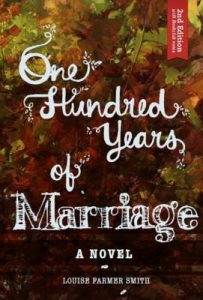 Patricia sacrifices her social life and romance to care for her mother, whom everyone assumes is going through “the change.” Patty knows better, but doesn’t know how to help her mother find herself after accommodating her husband their entire marriage. As she and her siblings come of age, they move on and away from their parents, becoming distinctly different individuals who come together in the end for Patty’s wedding. Told in short story form, going back generations, the women in Patty’s ancestry lay a foundation of accommodation and depression that she is determined to escape. The women in these stories are strong, but historical convention keeps them in check, and they don’t have the tools to continually fight social mores of gender expectations. The writing flows so well that the stories lead right into each other, though they can, and have (and won prizes), stand alone. Together, they show the pattern repeated by each generation of women in choosing partners to “save” them from their families, judging poorly based on immediate escape. That they stay with their ill choices is more a matter of their time in history, as shown by Patty’s mother being unable to get a driver’s license without her husband’s or father’s permission.
Patricia sacrifices her social life and romance to care for her mother, whom everyone assumes is going through “the change.” Patty knows better, but doesn’t know how to help her mother find herself after accommodating her husband their entire marriage. As she and her siblings come of age, they move on and away from their parents, becoming distinctly different individuals who come together in the end for Patty’s wedding. Told in short story form, going back generations, the women in Patty’s ancestry lay a foundation of accommodation and depression that she is determined to escape. The women in these stories are strong, but historical convention keeps them in check, and they don’t have the tools to continually fight social mores of gender expectations. The writing flows so well that the stories lead right into each other, though they can, and have (and won prizes), stand alone. Together, they show the pattern repeated by each generation of women in choosing partners to “save” them from their families, judging poorly based on immediate escape. That they stay with their ill choices is more a matter of their time in history, as shown by Patty’s mother being unable to get a driver’s license without her husband’s or father’s permission.